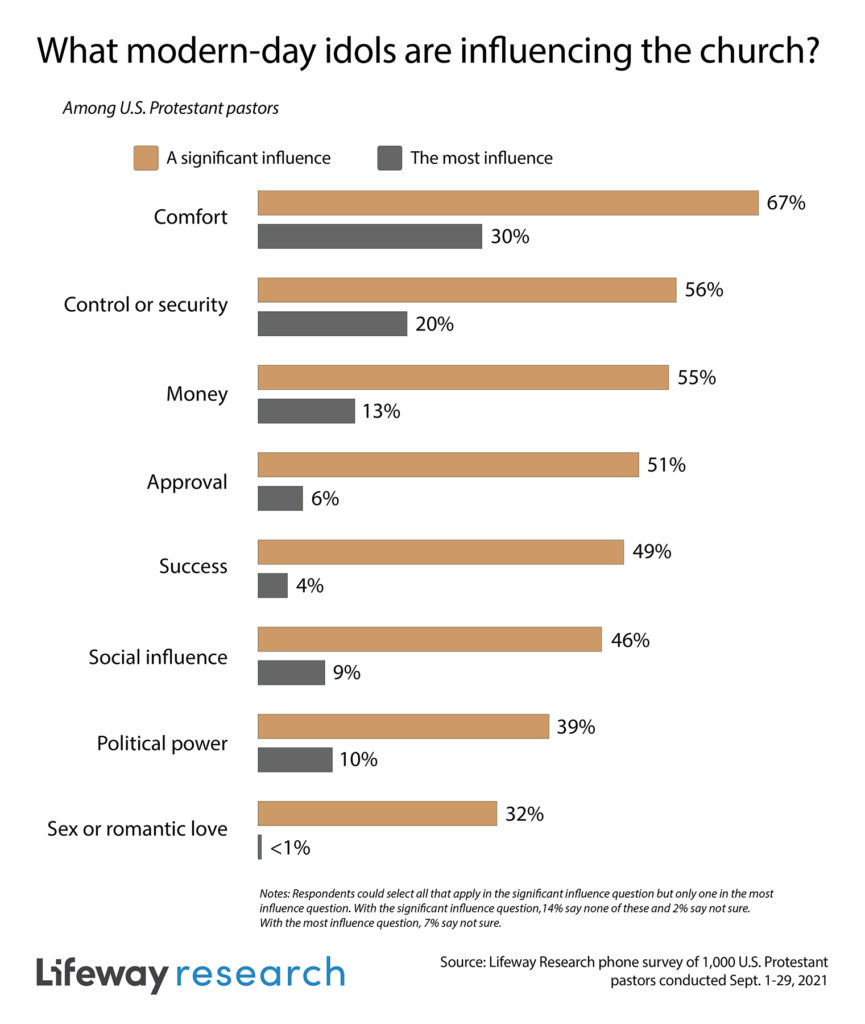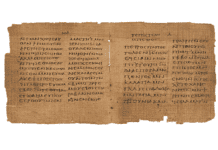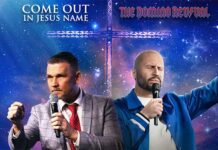“In many ways, the top three idols pastors recognize in their churches are related. Comfort and security draw the hearts of the most congregations, but they are often enabled by the pursuit of more money,” McConnell said. “Pastors of higher socioeconomic levels are quicker to recognize the influence of security and control while pastors of lower socioeconomic levels more readily see the draw of comforts.”
Denominational differences also play a role in how likely pastors are to say they recognize idolatrous influences in their congregations. Non-denominational (23%) and Pentecostal pastors (20%) are more likely than Methodist (9%) or Restorationist movement pastors (6%) to say they don’t see any of the potential idols influencing people in their churches.
Most Influential Idol
Comfort (30%), control or security (20%) and money (13%) also top the list of modern-day idols with the most influence on congregations. But political power (10%) and social influence (9%) climbed above approval (6%) and success (4%) when pastors were asked to select the one modern-day idol they believe has the most influence on their congregations. Less than 1% point to sex or romantic love as the idol with the most influence in their churches. Another 7% say they aren’t sure.

“Americans’ obsession with pursuing more stuff is clearly seen within the church as well,” McConnell said. “The largest number of congregations battle the influence of first-world comforts, and churches’ second most common modern-day idol is the commitment to keeping secure the comforts they already have.”
The allure of political power is more common in certain congregations. White pastors (12%) are more likely than African American pastors (2%) to say political power is the modern-day idol with the most influence on their congregations. And younger pastors—those 18-44 (14%) and 45-54 (13%)—are more likely than pastors over 65 (5%) to identify political power as the most influential idol in their congregations. Pastors in the Midwest (14%) and West (14%) are also among the most likely to say political power. Furthermore, pastors of Baptist (11%), Methodist (11%) and non-denominational (15%) churches are more likely than pastors of Presbyterian/Reformed (4%) churches to say political power is the idol with the most influence in their congregations.
Social influence holds more sway in large churches and is more often spotted by older clergy. Pastors at the largest churches, those with more than 250 in attendance (17%), are among the most likely to say social influence is the primary idol in their churches. Those over the age of 65 (13%) are more likely than pastors ages 18-44 (5%) to say social influence is the most influential idol in their churches. And Restorationist movement pastors (18%) are more likely than Baptist (8%), Methodist (8%) and Pentecostal (5%) pastors to say the same.
Denominationally, some pastors are more likely to see success as an idolatrous temptation for their congregations. Pentecostal pastors (13%) are more likely than Baptist (5%), Methodist (3%), Presbyterian/Reformed (3%) and Restorationist movement (less than 1%) pastors to say success is the most influential idol in their churches.
For more information, view the complete report.
This article originally appeared here.











